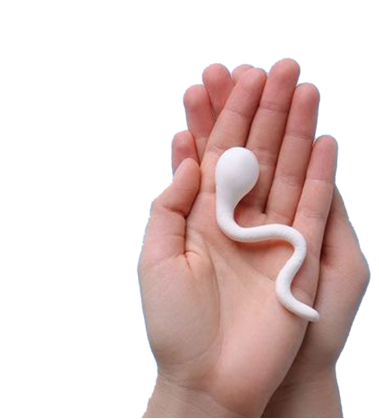The formation and transmission of healthy sperm by the body are determining factors for male fertility. Sperms are small reproductive cells or gametes produced by a male's body. They enter a woman's body during intercourse through ejaculation. Fertilisation occurs when an egg gets fertilised with the sperm, which enters the female partner's vagina and reaches her uterus via the cervix.
The inability of a man to conceive a fertile woman despite regular sexual activity is known as male infertility. Male infertility has drawn increased attention due to recent evidence of a decline in sperm quality and poor sperm quantity among young, healthy men worldwide. An estimated 7% of all men are suffering from infertility, with approximately 10-15% of infertile men having a complete absence of sperm.
A detailed analysis of the male infertility problem is necessary due to the male infertility issue's importance.


The primary symptom is infertility itself. However, it is significantly more challenging to describe the adverse emotional and psychological effects of infertility issues on an individual who aspires to have children. The following are the symptoms of infertility in men:





Male infertility can have several reasons, as a variety of factors influence one's fertility. Following are some of the causes of infertility in men:
Different types of male infertility issues are:-
The abnormal dilation and enlargement of veins inside the scrotum, a skin pouch holding testicles, is known as varicocele. Known to be among the most common reasons for male infertility, it leads to poor sperm morphology, very low sperm count, and decreased sperm motility. Though it can develop on either side, it typically appears on the left side.
An abnormal accumulation of fluid surrounding the testicles and spermatic cord in the scrotum is known as a hydrocele. Hydroceles are caused by an imbalance in the fluid secretion and reabsorption processes. The majority of people with this issue report having painless scrotal edema.
The condition of a low sperm count in semen is referred to as oligospermia. A male could suffer from oligospermia as a result of various underlying conditions such as chromosomal abnormalities, hormone imbalances, obstructions, or ejaculatory problems.
The most severe kind of infertility in men, it refers to the complete lack of spermatozoa in the ejaculate. Sperms produced by a male's testicles bond with fluid found in the seminal vesicles to produce semen that comes out from the penis during ejaculation. Various factors leading to aberrant sperm production can ultimately result in azoospermia.
A male can improve his production of healthy sperm by incorporating certain modifications in his lifestyle. Tips to manage male infertility include:


Owing to advances in science and technology, there are now a greater number of options for treating male infertility. However, the majority of these standard male infertility treatment options come with associated risks and adverse side effects. The requirement is necessary to address the problem at its root. And precisely, this is what homeopathy aims to accomplish.
Starting a homeopathic treatment for male reproductive disease has no prerequisites. Anyone who has recently discovered that they have this issue or has tried other forms of treatment without success can easily get in touch with a homeopath. Due to its side-effect-free results, homeopathic treatment is regarded as one of the safest options for addressing male infertility issues.
Male infertility homeopathic treatment has a high success rate. Additionally, homeopathic treatments improve sperm abnormalities and boost sperm count. Individualised homeopathic treatment can serve as an effective alternative to traditional treatment for infertile men, as the rate of improvement in sperm count attained with homeopathic medication is equivalent to that gained by conventional treatment.




